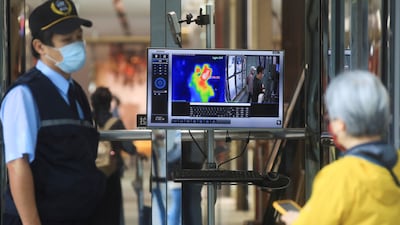Live updates: follow the latest news on Covid-19 variant Omicron
The ability of the coronavirus to mutate into more contagious and sometimes more dangerous variants often catches countries off guard.
And yet, according to Emma Hodcroft, a molecular epidemiologist at the University of Basel in Switzerland, the virus mutates at about half the rate of the influenza virus.
That dashes any hopes that the coronavirus could soon mutate into a less dangerous form, as happened to the H1N1 viruses of the Spanish flu pandemic of 1918 to 1923.
Instead, experts tell The National that global vaccination efforts are vital in reducing the risk of and conquering Covid, the disease caused by the virus, once and for all.
The shock of mutations
In February, Indian Prime Minister Narendra Modi told reporters his country had “shown the world” how to tackle the coronavirus.
But events moved quickly, and by April scientists had identified B.1.617.2, the Delta variant of the virus, saying that it had probably been in circulation since December 2020.
In June, scientists in the UK said that the Delta variant could be up to 60 per cent more transmissible than the Alpha of the virus that was dominant in the UK at the time.
In turn, Alpha was thought to be three times more transmissible than the original strain of the virus that emerged in Wuhan, China, in 2019.
The human toll in India and around the world is horrifying. As many as four million Indians may have died from the virus, a statistic that shows why there is so much concern about the Omicron variant.
At the time of Delta's emergence, India's vaccination rate was less than three per cent, far lower than South Africa where Omicron is now gaining a foothold.
This raises the question of how to stop more dangerous mutations, particularly in parts of the world where vaccine distribution is poor.
Vaccination end game
Most scientists now agree widespread global distribution of vaccines is essential.
On November 5, WHO director-general Tedros Adhanom Ghebreyesus urged manufacturers to speed up delivery of vaccines to developing countries through the Covax scheme.
“Let me be very clear: this should not be happening. We have all the tools to prevent transmission and save lives, and we continue to call on all countries to use those tools,” he said, making the point again to the World Health Assembly on Monday.
Dr Islam Anan, a lecturer in pharmacoeconomics at Egypt's Ain Shams University and a public health consultant, said vaccine inequity was central to an increased risk of new, more dangerous coronavirus mutations.
"To start with, we are in this scenario because of vaccine nationalism," he said.
"We do have the resources. We do have capacity to produce much, much more vaccine doses than we have now. And we can actually distribute them. But whenever you see the G7 go to a meeting and promise three billion doses to fragile countries, they struggle to deliver half of that."
By October, around 300 million vaccines had been delivered through the Covax scheme. In May, Covax announced its ambition to deliver two billion doses in 2021 but it is expected that by January Covax will have shipped about 1.45 billion of those.
About 11 billion doses are needed around the world to slow the mutation of the virus and the stall Covid-19, the WHO said.
"If you continue with inequity and no fair distribution of vaccines in Africa, we can expect to have a new variant with an escape mutation in the first quarter of 2022," Dr Anan said.
Stopping dangerous variants in time
An added danger is that coronavirus variants can circulate undetected for months in parts of the world where testing is patchy or where little or no genomic sequencing to identify variants has been carried out.
Even with South Africa's rapid identification of the variant, Omicron could have been in circulation for more than a month, according to a health expert at Yale University.
Nicholas A Christakis’ analysis follows other findings on the mutation of the virus that place the identification of a variant weeks or even months after it first emerged.
“The Omicron variant likely arose much earlier than when it came to our notice, probably in early October,” Dr Christakis said.
This silent spread of dangerous variants calls into question the policy of closing borders that is common among governments.
“We may assume Omicron is everywhere and that border closures are of little use. Whether they will be easy to undo, politically, is another matter,” Dr Christakis said.
According to Gavi, the multinational and multi-NGO vaccine alliance, widespread vaccination among these populations could reduce the potency of the coronavirus.
“Vaccines might enable us to outpace the virus. Even though they don’t fully protect against infection, they could provide the firebreak that’s needed to extinguish Covid-19 outbreaks. But for that to happen, they need to be rolled out quickly, and to as many people as possible,” the alliance said.
Countries with high vaccination rates are still stepping up to help, but there are logistical challenges.
Moderna chief executive Stéphane Bancel recently said that 70 million doses of his company's vaccines were in storage, unclaimed by either Covax or the governments that had asked for them.
On Tuesday, India said it was ready to "expeditiously" send more vaccines to Africa to help fight the Omicron variant. That followed a new Chinese commitment of one billion vaccine doses.
Greater international efforts cannot come soon enough. On Tuesday, Mr Bancel warned that Omicron could produce a "material drop," in the effectiveness of vaccines, although he said it would be some time before anyone knew how serious such a drop in effectiveness could be.



























